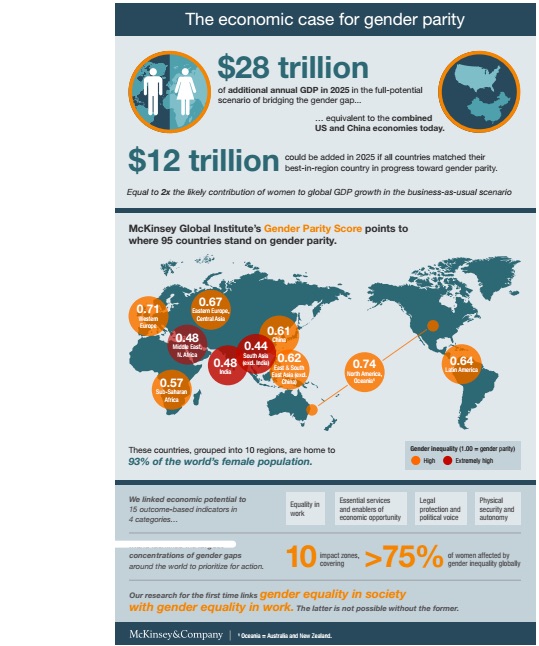Parity: The state or condition of being equal,
especially regarding status or pay.
March 8 is International Women’s Day. Officially adopted in the West in 1975, the day has been celebrated internationally since 1909. This year’s theme is about achieving parity. In a 2015 report, the World Economic Forum predicted that we will not achieve global economic parity until the year 2133.
Worldwide, women are still fighting for the same economic, educational, social and legal opportunities as men. While progress is being made on all these fronts, we still have a long way to go. In a 2015 Global Gender Gap report by the World Economic Forum, the top 10 countries closest to achieving economic parity are in Europe and Central Asia. Where does the United States rank? 28th out of 145.

Achieving parity seems like it should be a no-brainer. Women are good for business. Take Iceland, for example. They have created laws to ensure equal participation on company boards, lengthened paid maternity/paternity leave to nine months, banned strip clubs and, since 2014, 25 out of 63 seats in their Parliament are held by women. It’s no wonder the country has been leading the world in gender equality since 2009.
As women, we need to ask ourselves what more we can be doing in our workplaces to help ourselves and each other. And, we need the men in our lives to be our allies by doing their share of “leaning in.”
In his book, Lean In For Graduates, Kunal Modi wrote that in the workplace, men should make a concerted effort to encourage an environment that helps women succeed, in part by not casting women in supporting roles, setting up bias training programs, and establishing mentorships.
For the US to move up in the World Economic Forum’s rankings, we need our policymakers to really understand and appreciate the financial boon that closing the gender gap will have on our economy.
“Women who are paid fairly and paid what they’re worth will likely spend that money to support themselves and their families, because so many women live in poverty and need every penny they get in their paychecks. So the turnover effect could be extremely important in terms of products purchased and jobs created,” said economist and resident scholar at Brandeis University Evelyn Murphy.
Closing the gap goes beyond business. Empowering women socially, politically, economically and educationally creates generational wealth and stability. When women are empowered, society as a whole reaps the rewards.
Resources for more reading on what can be done to close the gender gap:
The World Economic Forum 2015 Global Gender Gap Report
McKinsey Global Institute Report: The Power of Parity





